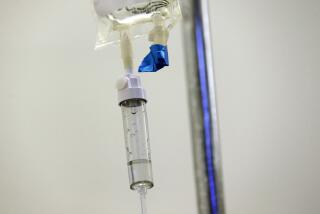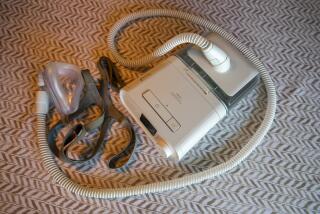Implant Companies’ Stocks Decline : Reaction: Some makers are considering whether to stay in the business after the moratorium. A temporary halt to such surgeries is seen.
- Share via
The federal government’s moratorium on silicone gel breast implants is expected to bring most of the half-billion-dollar implant industry temporarily to a halt and sent stocks of companies making the devices plunging Monday.
The Food and Drug Administration asked manufacturers of the implants to refrain from shipping them, and doctors to stop using them, until new data on their safety can be reviewed for another 45 days. The manufacturers protested the moratorium and insisted that their products are safe but said they would comply with the voluntary ban.
At silicone maker Dow Corning, the moratorium won’t hurt much because implants are a tiny part of its total business. But a number of smaller makers, including Santa Barbara-based Mentor Corp., will be hard hit.
And thousands of plastic surgeons specializing in breast augmentations and reconstructions will see a steep drop in their incomes, which have already been hit by the recession and publicity about possible dangers from the implants. Surgeons’ fees account for the bulk of the implant industry’s revenues; sales of the devices totaled only about $50 million last year.
Reaction from patients in Southern California, one of the nation’s most active plastic surgery markets, appears to be mixed. At the Santa Monica offices of Dr. DennisThompson, one patient with implants for six years asked to have them removed after hearing the FDA announcement this morning. But another wanted to go through with her scheduled breast augmentation and was concerned that the FDA decision would prevent the surgery later this month.
The second patient won’t be able to get the operation on schedule, according to Thompson, president of the Los Angeles Society of Plastic Surgeons. He said he believed that the implants were safe but that “I expect plastic surgeons will adhere to the (FDA) recommendation” to temporarily refrain from using implants.
For Dow Corning, which makes silicone products for everything from pacemakers to aircraft parts, breast implants are less than 1% of its $1.7 billion in annual sales. Robert Grupp, a spokesman, said he did not expect the FDA decision to have an effect on the company’s financial condition.
Grupp said Dow Corning was “evaluating” whether to stay in the implant business. “At some point this becomes a business decision,” he said, adding that the product had been losing money for the past five years in part from increased price competition.
Dow Corning is appealing a December federal court decision in San Francisco ordering it to pay $7.34 million to a woman who charged that the rupture of her silicone-filled breast implant caused a disease of the immune system.
Bristol-Myers Squibb got out of the implant business recently after some laboratory studies had linked its polyurethane implant to cancer. At Mentor Corp., which depends on breast implants for 25% of its sales, the FDA decision sent its stock plunging $2 per share to $12.25 in over-the-counter trading Monday. Until last year, Mentor saw sales growth of about 15% a year in its plastic surgery device business, made up mostly of breast implants, to total nearly $28 million last year. Mentor also makes saline-filled breast implants, which do not come under the FDA moratorium. But Dennis Condon, president of Mentor’s plastic surgery division, said he hoped that further data would persuade the FDA to approve the use of silicone implants, because some doctors and patients prefer them.
One implant maker that might benefit from the FDA’s scrutiny of silicone is St. Paul, Minn.-based Bioplasty. Eric Petersen, an investment banker who has done private placements of the company’s stock, said Bioplasty’s implants are made of an inorganic polymer that, unlike silicone, is excreted by the body if the implant ruptures.
Bioplasty withdrew its implants from the market last year after the FDA said it did not have enough data to prove their safety. But if the company wins approval through additional studies, it could take over market share from firms using silicone, Petersen said.
In other stock activity, Inamed, an implant maker based in Carpinteria, fell 75 cents per share to $2.25 in over-the-counter trading.
MAIN STORY: A1
More to Read
Inside the business of entertainment
The Wide Shot brings you news, analysis and insights on everything from streaming wars to production — and what it all means for the future.
You may occasionally receive promotional content from the Los Angeles Times.










